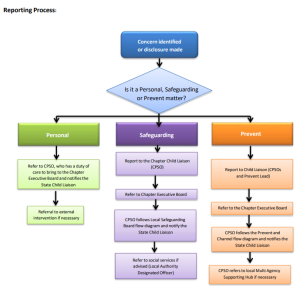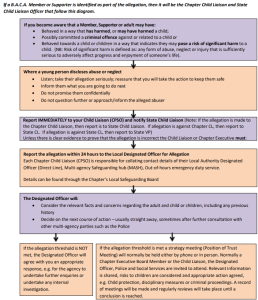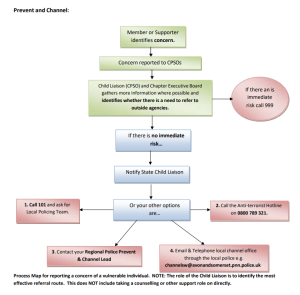Version: Revised by: Date: Approved by:
1.0 Red Mol 5 Nov 2016 Guts
1.1 Invictus 29 Aug 2018 SEB
1.2 Dozer 30 May 2020 SEB
1.3 Dozer 3 October 2020 SEB
1.4 Dozer 16 June 2021 SEB
1.5 Dozer, Blue, Mo, Gunner
19 March 2023 SEB
1.6 Mo, Dozer 08 April 2023 SEB
1. Purpose
B.A.C.A. International UK Limited. (B.A.C.A.) is committed to carrying out its responsibilities under the relevant legislation, regulations and guidance for Safeguarding and Wellbeing, so that it can: ‘create a safer environment for abused children’ and ‘empower children to not feel afraid of the world in which they live’. These children identified are aged under 18 years (as per B.A.C.A. Child Liaison Policy and Procedure) and are covered by the legislation referring to the Safeguarding of Young People and Vulnerable Adults. This Policy has been drawn up on the basis of Law and Guidance that seeks to protect the children, namely:
• The Rehabilitation of Offenders Act 1974 (Exceptions) Order 1975
• Children Act 1989
• United Nations Convention of the Rights of the Child 1991
• Human Rights Act 1998
• Data Protection Act 1998
• Sexual Offences Act 2003
• Children Act 2004
• Sexual Offences (Scotland) Act 2009
• Equality Act 2010
• Protection of Freedoms Act 2012
• Children and Young People (Scotland) Act 2014
• Social Services and Well-being (Wales) Act 2014 (SS&WB Act)
• Well-being of Future Generations(Wales) Act 2015
• Data Protection Act 2018.
• Working together to Safeguard Children 2018
• Children (Scotland) Act 2020
• National Guidance For Child Protection in Scotland 2021
• Getting it Right for every Child (Scotland) 2022
• Working together to safeguard people (Wales) 2022
B.A.C.A. believes that its Members and Supporters have the responsibility to promote the welfare of all children and young people and to keep them safe. We are committed to practice in a way that protects them. To achieve this, we as Members and Supporters of a volunteer organization and the children we work with, need to feel safe within our working environment, ensuring that:
• All Members and Supporters use safe working practices in their working environments, and all children are
appropriately supervised by suitably trained B.A.C.A. Members and Supporters when undertaking all activities
• All Members and Supporters strictly adhere to the Two-Patch Rule, which states that a minimum of two Members should always be present when interacting with B.A.C.A. children
• B.A.C.A. Members and Supporters are aware of their own duties and responsibilities in creating a safe environment for all, which is demonstrated through appropriate training, behavior and attitudes
• All children are safeguarded and protected
• B.A.C.A. Members and Supporters are familiar with guidance and procedures regarding who to speak to if they have a Welfare, Safeguarding or Prevent concern. This is achieved through Introductory Safeguarding training or a formal Advanced Safeguarding qualification.
2. Definition of Safeguarding
Within the guidance document ‘Working together to Safeguard Children’ (2018), Safeguarding is defined as:
• Protecting children from maltreatment
• Preventing impairment of children’s mental and physical health or development
• Ensuring that children are growing up in circumstances consistent with the provision of safe and effective care
• Taking action to enable all children to have the best outcomes.
It describes ‘Children’ as including everyone who is under 18. The Safeguarding of adults lies outside the B.A.C.A Mission. However, Members receive training on Safeguarding adults so they can understand the impact of vulnerable adults on children and also identify and report safeguarding concerns to the appropriate authorities.
3. Roles and Responsibilities
Safeguarding responsibilities at all levels of B.A.C.A. UK:
Trustees • Ratify appointment of State Child Liaison.
• Ensure proficiency and ongoing training of State Child Liaison.
• Accountable for implementing and communicating all changes to Safeguarding (through
instructing State Child Liaison.)
• Responsibility for understanding UK Safeguarding policies and how it affects the Trustees and the
Organization.
• Ensure reasonable Safeguarding measures must be in place according to U.K. Law and guidance.
• Ensure B.A.C.A. U.K. Safeguarding Policy must be fit for purpose, proportionate and current.
Decisions regarding Safeguarding measures to be adopted in B.A.C.A. U.K. are to be made by
the Trustees/Directors. State The State Executive Board (SEB) is responsible for identifying and appointing a suitable State Child Liaison and approving annual reviews of the Safeguarding and Referrals Policy.
State Child Liaison is responsible for:
• Reviewing the Safeguarding and Referrals Policy and making recommendations to the SEB for
approval annually.
• Operational accountability for all Safeguarding Policy and activity at the direction of Trustees.
• Holding basic reports of all cases reported to the authorities but no personal details under the
Data Protection Act.
• Retaining current knowledge of all relevant Safeguarding legislation and inform Trustees
of any material changes.
• Providing support to Chapters for Safeguarding training.
• Ensuring each Chapter has nominated a Chapter Child Liaison and that they are sufficiently
trained to carry out their safeguarding duties.
• The register of Safeguarding training attended by UK Members and Supporters and ensuring all
have received the appropriate training.
• Responsible for the review of the Safeguarding Policy in conjunction with current UK policy and
regulations.
State Training Officer is responsible for supporting the State Child Liaison by maintaining the UK
register of Safeguarding training with information received from Chapter Training Coordinators.
Chapter Chapter Executive Board (CEB) is responsible for:
• Identifying and appointing a suitable Chapter Child Liaison.
• Ensuring that all Chapter Members successfully complete an Advanced Safeguarding
qualification and that all supporters successfully complete Introductory Safeguarding
training.
Chapter Child Liaison (CL) will:
• Act as the Designated Safeguarding Lead (DSL) for their Chapter. In B.A.C.A. this role is called
the Child Protection and Safeguarding Officer (CPSO)
• Report to State Child Liaison as needed to ensure B.A.C.A. Trustees are informed of all
Safeguarding issues in line with Trustee legal responsibilities.
• Have an Advanced Safeguarding qualification and retake the full advanced training every two years.
• Be the identified lead for Channel and Prevent.
• Complete a risk assessment for each child after Initial Contact Meeting, and before
confirming B.A.C.A. involvement.
• This will include checking crime reference numbers with the police.
• Communicate B.A.C.A. involvement with a child to the local Safeguarding Board once an
Initial Contact Meeting is complete and we have agreed to engage with the child,
ensuring the parents know this is being done.
• Organize Advanced face-to-face Safeguarding training as needed, for all Members by a
B.A.C.A. UK approved trainer.
• Organize on-line Introductory Safeguarding training for Tomato Patch upwards as needed, by a
B.A.C.A. UK approved trainer.
• Keep and maintain records of training which are forwarded to the Chapter Training Coordinator.
• Report all disclosures to the Local Safeguarding Board (LSB) using the flow diagram and keep
the Chapter Executive Board notified.
• Keep all records of disclosures using LSB forms. These are to be confidential in-line with the Data
Protection Act.
• Provide basic report of numbers to State Executive Board regularly of disclosures, excluding
personal details.
• Ensure that all Members are aware of Safeguarding themselves.
Chapter Training Coordinator is responsible for maintaining the Chapter register of Safeguarding
training and reporting to the State Training Officer.
Chapter Security Officer will carry out a risk assessment before B.A.C.A. events and liaise
with the Child Liaison to ensure the safety of children present.
Individual • Responsible to report all Safeguarding concerns to the Chapter Child Liaison.
• Attend and complete Safeguarding training as part of their initial training.
• Ensure that they safeguard themselves.
• Actively uphold the Safeguarding policy in all activity.
• On qualifying for the award of a Tomato Patch, it is necessary to complete the internal B.A.C.A.
Introduction to Safeguarding course. External courses will only be considered by the SEB in
circumstances of Force Majeure.
• Supporters may not be present with B.A.C.A. children until they have completed Introductory
Safeguarding training.
• New Supporters must receive and read the B.A.C.A. UK Safeguarding Policy.
• On being elected to Membership, it is necessary to complete the internal B.A.C.A. Advanced
Safeguarding course. External courses will only be considered by the SEB in circumstances of
Force Majeure.
• Members may not become a Primary until they have completed Advanced Safeguarding training.
• The SEB has the facility to confirm the suitability of external training courses in Safeguarding.
• Course assessment will include content comparison and accreditation to an appropriate level by an Ofqual-recognized awarding body, e.g. Nuco training, OCN London, OCR, City & Guilds, SQA, etc.
• Investigate allegations / disclosure of a B.A.C.A. Member using the same flow diagram as a Chapter Child Liaison to the appropriate LSB and notify Trustees*
• Keep all records of disclosures using LSB forms. These are to be confidential in-line with the Data Protection Act.
*If there is no State Child Liaison then a Chapter Child Liaison from another Chapter will be asked to carry out an independent
investigation.
4. Safer Recruitment
All B.A.C.A. Members and Supporters are required to have ‘Enhanced background and security with a barred check list’ check, through the Protecting Vulnerable Groups (PVG) through Disclosure Scotland, once we have demonstrated our commitment as stated within B.A.C.A. International Policy and Procedure. PVG checks are carried out by a registered ‘umbrella’ body or by Volunteer Scotland.
All B.A.C.A. Chapters are responsible for the vetting of their own prospective Applicants and Supporters before putting them forward to the security check stage, with Safeguarding foremost in the decision-making process by the Chapter Executive Board.
Security checks are carried out by identified and approved Chapter personnel. Returned PVG certifications from the authorities are stored securely by the individual Chapter Security Officer in accordance with the Data Protection Act 1998 and the General Data Protection Regulation (GDPR) Act 2018.
5. Training
All Supporters receive online Introductory Safeguarding and Prevent Duty training upon attaining their T-Patch. Upon attaining their T-Patch, all Supporters must complete Safeguarding and Prevent Duty training prior to being present at any events/ activities involving B.A.C.A. Children. All Supporters receive online Introductory Safeguarding and Prevent Duty training, every three years until they become a Member. Introductory training is completed live online with a B.A.C.A. trainer approved by the SEB.
Upon election to Membership, Members undertake face-to-face Advanced Safeguarding Training to attain a Level 3 Award in Principles of Safeguarding and Protecting Children, Young People or Vulnerable Adults qualification. This is completed ‘face-to face’ with a B.A.C.A. trainer approved by the U.K. SEB.
Members receive online refresher training every three years.
In Scotland, the training is provided by a third-party trainer approved by the U.K. SEB.
Safeguarding training will include as key areas of focus:
• Safeguarding Legislation and guidance
• Indicators of Abuse and Neglect including:
• Physical Abuse
• Sexual Abuse including Child Sex Exploitation
• Psychological / Emotional Abuse
• Neglect and Acts of Omission
• Substance Misuse
• Domestic Abuse
• Fabricated or Induced Illness
• Radicalization and/or Extremist Behavior
• Specific issues that relate to the local area and population
• Other issues that pose a risk to children, young people and vulnerable adults.
• Contextual Safeguarding
• Making judgements and communicating worries and concerns
• Roles and responsibilities
• Allegations and complaints.
6. Wellbeing
B.A.C.A. is committed not only to the children that it helps but to support its Members and Supporters. Everyday problems can increase the pressure they are under, directly affecting physical and emotional wellbeing. B.A.C.A. ensures that there is support for Members and Supporters to ‘off-load’ and ‘debrief’ through the Sponsors and Child Liaison roles, reducing stress so that the B.A.C.A. Mission can be successful.
7. Safeguarding in Scotland
In Scotland, the definition of a child is up to the age of 18 but where necessary adult support and protection can apply to young people over the age of 16. All references in this policy to ‘local safeguarding board’ apply in Scotland to Child Protection Committees (CPCs) which are responsible for multi-agency child protection policy, procedure, guidance and practice.
Safeguarding training in Scotland should be carried out by SEB approved trainers that include training on local legislation and practice including the ‘SHANARRI’ principles of children having the right to be: ‘Safe, Healthy, Achieving, Nurtured, Active, Respected, Responsible and Included’.
This section of the policy is also relevant to all those involved in making application/disciplinary decisions in B.A.C.A. U.K., specifically within Scotland. When a Member or Supporter is permanently removed from a regulated work position, there are certain circumstances where our organization must notify the Protection Unit at Disclosure Scotland that this has happened. This is called ‘Making a Referral’. If B.A.C.A. U.K. has permanently removed the individual, the actions detailed in this policy will continue to apply (even if a Member or Supporter leaves their regulated work position prior to any action being taken, irrespective of the reason that they leave).
Two conditions must be met before we let Disclosure Scotland know that something has happened:
Condition 1: A person has been permanently removed/ removed themselves from regulated work with B.A.C.A. U.K.
Condition 2: At least ONE of the following FIVE grounds apply:
• Caused harm to a child or protected adult
• Placed someone at risk of harm
• Engaged in inappropriate conduct involving pornography
• Engaged in inappropriate sexual conduct
• Given inappropriate medical treatment.
When both Conditions 1 and 2 have been met, it is a legal requirement that B.A.C.A. U.K. must let Disclosure Scotland know by Making a Referral within 3 months of the permanent removal of the individual. Where there is an historical allegation of harm or inappropriate behavior about someone who is no longer in regulated work with B.A.C.A. but which we believe would, in all probability, have led to Conditions 1 and 2 being met, we will consider whether we want to Make a Referral but the legal responsibility applies only after 28 February 2011 when PVG was first introduced.
Where it is necessary to Make a Referral, this process will be carried out by the State Child Liaison. In their absence, the referral process will be carried out by the State President. Those who are in a position, which may involve carrying out disciplinary action, which may result in the removal from regulated work or dismissal of someone in regulated work must ensure they notify the State Child Liaison or, in their absence, the State President of the legal requirement to Make a Referral where the conditions above have been met. Failure to Make a Referral where required, may result in our organization being prosecuted. It is therefore essential that those involved in carrying out disciplinary action notify the State Child Liaison or the State President when both conditions for Making a Referral have been met.
8. Safeguarding in Wales
The Children Act 1989 and 2004 applies to Wales. Almost 30% of the population speak Welsh. In Gwynedd county 75% speak Welsh. B.A.C.A. chapters in Wales must therefore meet the requirements and standards of the Welsh Language Measure 2011. In Wales, B.A.C.A. recognizes its “duty to report” (Section 130 of SS&WB Act) a child at risk of abuse, neglect and/or harm to the local authority social services.
In Wales, safeguarding boards are regional and cover more than one local authority. Chapters in Wales should make themselves aware of who to contact at their local social services as well as the Regional Safeguarding Boards listed here: Safeguarding Wales.
All references in this policy to ‘local safeguarding board’ apply in Wales to ‘Regional Safeguarding Boards’ which are responsible for multi-agency child protection policy, procedure, guidance and practice. Safeguarding training in Wales should be carried out by SEB approved trainers that include training on local legislation and practice. Regional Safeguarding Boards provide lists of approved trainers and should be contacted in the first instance. Safeguarding training should be offered in the English or Welsh language as
required by individual Members or Supporters.
9. Dealing with Concerns and Allegations
In Safeguarding, the term ‘disclosure’ describes the act of disclosing information relating to the welfare of a person(s), and may contain information that raises concerns of harm occurring. If a disclosure is made, all directly involved must be made aware that it cannot be kept confidential.
B.A.C.A. U.K. will have identified CPSOs within each chapter. This will be alongside the role description for the Child Liaison outlined in the B.A.C.A. Child Liaison Policy and Procedure. CPSOs will deal with all Safeguarding and Prevent Duty and all identified CSPOs are required to undertake Advanced Safeguarding training which is renewed every two years to maintain currency. All B.A.C.A. Members and Supporters are fully aware of whom the CPSO is from their induction. Any concerns involving children they are working with, including Safeguarding or Prevent issues that need to be discussed, must all be flagged through the CPSO to ensure that the correct process is followed.
Reporting Process

Allegations Against Adults: ‘Risk of Harm to Children’ flow diagram

Prevent and Channel



